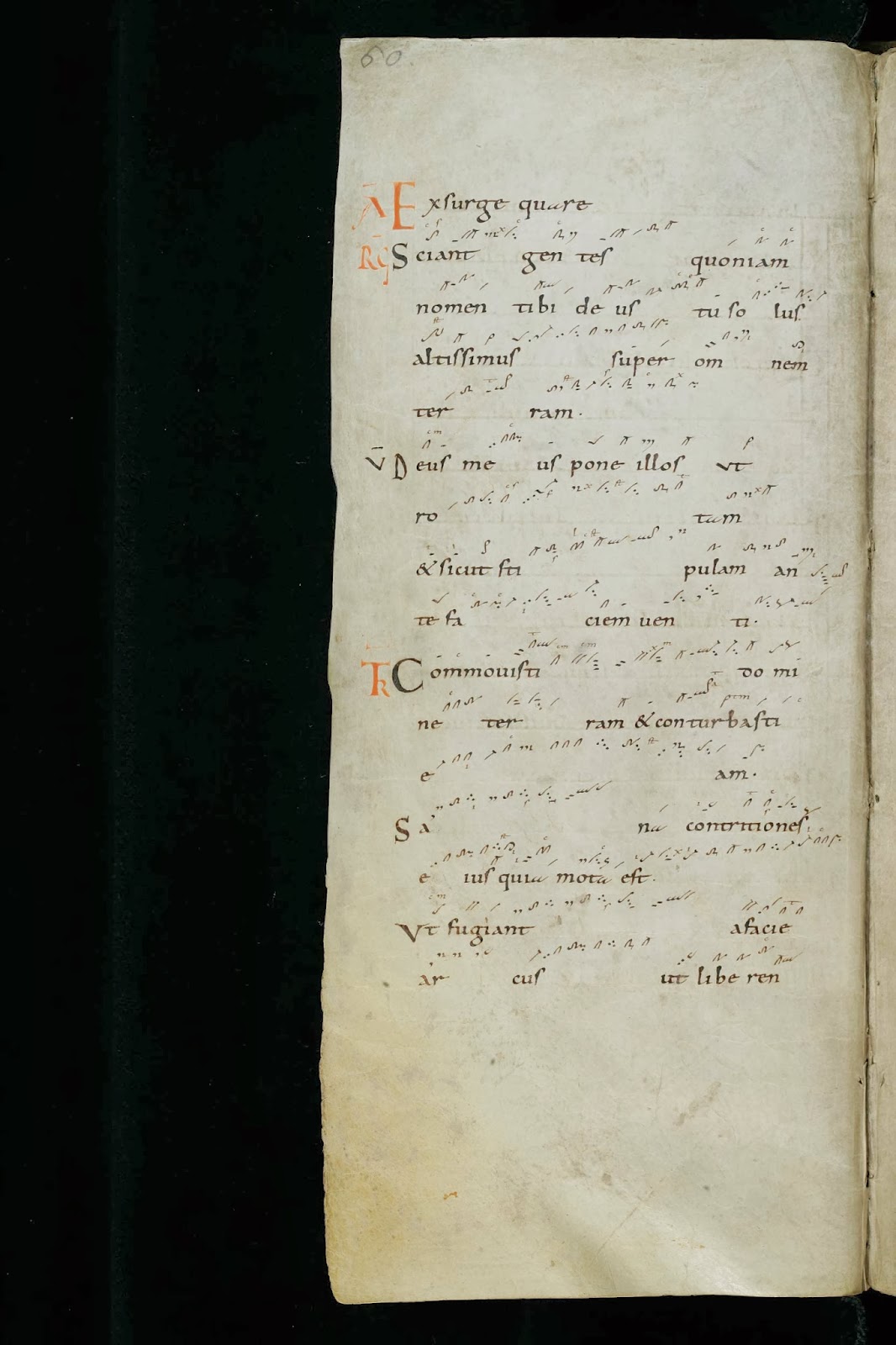Sciant Gentes ("Let the Gentiles know") is the Gradual for the Second Sunday in Lent.
Gradual • Sciant Gentes Quoniam Nomen Tibi Deus from Corpus Christi Watershed on Vimeo.
The text is taken from Psalm (82/)83, vv 18, then 13; here's an English translation:
(Other translations have "whirling dust" or "tumbleweeds" instead of "wheel," in that second verse! Interesting.)
Here's the full score:
Sciant Gentes was originally, it seems, the Gradual for Septuagesima Sunday.
Here's a bit about Psalm 83:
Here is a page from the Sankt-Gallen, Cantatorium, CH-SGs 359, f. 60, that includes this Gradual:
About that "St. Gall Cantatorium":
You can see other images of the chant via links here, at gregorien.info.
It looks like Luigi Cherubini set this text - but it was apparently never recorded until The Kammerchor Stuttgart did it in 2013! So, no video here.
Here are all of today's chant propers, sung by the Sao Paulo Benedictines:
Here are links to Chantblog articles about some of these:
Gradual • Sciant Gentes Quoniam Nomen Tibi Deus from Corpus Christi Watershed on Vimeo.
The text is taken from Psalm (82/)83, vv 18, then 13; here's an English translation:
Let the Gentiles know that God is Thy Name: Thou alone art the Most High over all the earth.
Vs. O my God, make them like a wheel, and as stubble before the wind.
(Other translations have "whirling dust" or "tumbleweeds" instead of "wheel," in that second verse! Interesting.)
Here's the full score:
Sciant Gentes was originally, it seems, the Gradual for Septuagesima Sunday.
Here's a bit about Psalm 83:
Psalm 83 is the last of the Psalms of Asaph, which include Psalms 50 and 73-83. It is also the last of the so-called "Elohist" collection, Psalms 42-83, in which the one of God's titles, Elohim is mainly used.[1]:405[2]:7 It is generally seen as a national lament provoked by the threat of an invasion of Israel by its neighbors. The psalm has been seen by some commentators as being purely cultic in nature. Others have indicated that the fact that particular nations are specifically named indicates that it does refer to a specific historical period, even though the prayer itself would be offered in the Temple in Jerusalem.[3] The dating of the composition of the Psalm is debated, but the reference in verse 9 to Assyria is by many sources seen as an indication that the Psalm was written during the time of Assyrian ascendancy, the ninth to seventh centuries BC.[4] Others have placed the composition of the psalm between the time of Saul to the age of the Maccabees,[3] suggested by Theodore of Mopsuestia.[5]
Here is a page from the Sankt-Gallen, Cantatorium, CH-SGs 359, f. 60, that includes this Gradual:
About that "St. Gall Cantatorium":
The so-called Cantatorium of St. Gall, the earliest complete extant musical manuscript in the world with neume notation. It contains the solo chants of the Mass and constitutes one of the main sources for the reconstruction of Gregorian chant. Written and provided with fine neumes in the monastery of St. Gall between 922 and 926. Bound in a wooden box with an ivory panel on the front cover, most likely Byzantine c. 500, depicting scenes from the fight of Dionysos against the Indians. The ivory panel was once the possession of Charlemagne.
You can see other images of the chant via links here, at gregorien.info.
It looks like Luigi Cherubini set this text - but it was apparently never recorded until The Kammerchor Stuttgart did it in 2013! So, no video here.
Here are all of today's chant propers, sung by the Sao Paulo Benedictines:
Hebdomada secunda quadragesimæ Introitus: Ps. 26, 8.9 et 1 Tibi dixit cor meum (cum Gloria Patri) (2m59.6s - 2808 kb)
Dominica
Graduale: Ps. 82, 19. V. 14 Sciant gentes (3m00.8s - 2828 kb) score
Tractus: Ps. 59, 4.6 Commovisti (2m18.1s - 2160 kb) score
Offertorium: Ps. 118, 47.48 Meditabor (1m16.1s - 1192 kb) score
Communio: Mt. 17, 9 Visionem (2m36.4s - 2446 kb) score
Here are links to Chantblog articles about some of these:


4 comments:
My guess us that Jerome here is following the Septuagint, which makes the "wheel" and the "chaff before the wind" to be separate similes. The King James translators made the same choice, even with access to the Masoretic text. The alternate translations treat the phrase as a single simile, perhaps rendered, "like the whirl of chaff before the wind." That's a better image for me than either of the separate similes.
Beautiful gradual. I do like how it becomes considerably more oscillatory in tone when it hits the "whirling" part of the text. There's a little musical conversation between "roam" and "stipulam" that is quite charming.
Interesting, C. Where did you get "Jerome" from here? Did the KJV come directly from the Vulgate - or do you just happen to know something about the original?
(Young's Literal has "rolling thing," BTW! Very interesting, all of it. Jerome used "rotam," it seems....)
I generally assume, unless corrected, that Latin chant texts come from the Vulgate. Hence, "Jerome." That's what I did here. (I just checked…)
Group translation processes are always a bit of a mystery. If you had asked the KJV translators what they were working with to translate the Psalms, my guess is that they would point to the Hebrew. At the same time, the Latin Psalms would be in their bones. Both those educated in England and in the Continent still would have prayed two or three times daily in Latin while in school. My guess is that they relied on non-Hebrew sources when they were confused.
Yes, that does make sense; I've never really considered the source of the texts before, actually! But I guess I should have, since the Vulgate must have been the only game in town for most of the last 2 millennia....
Post a Comment